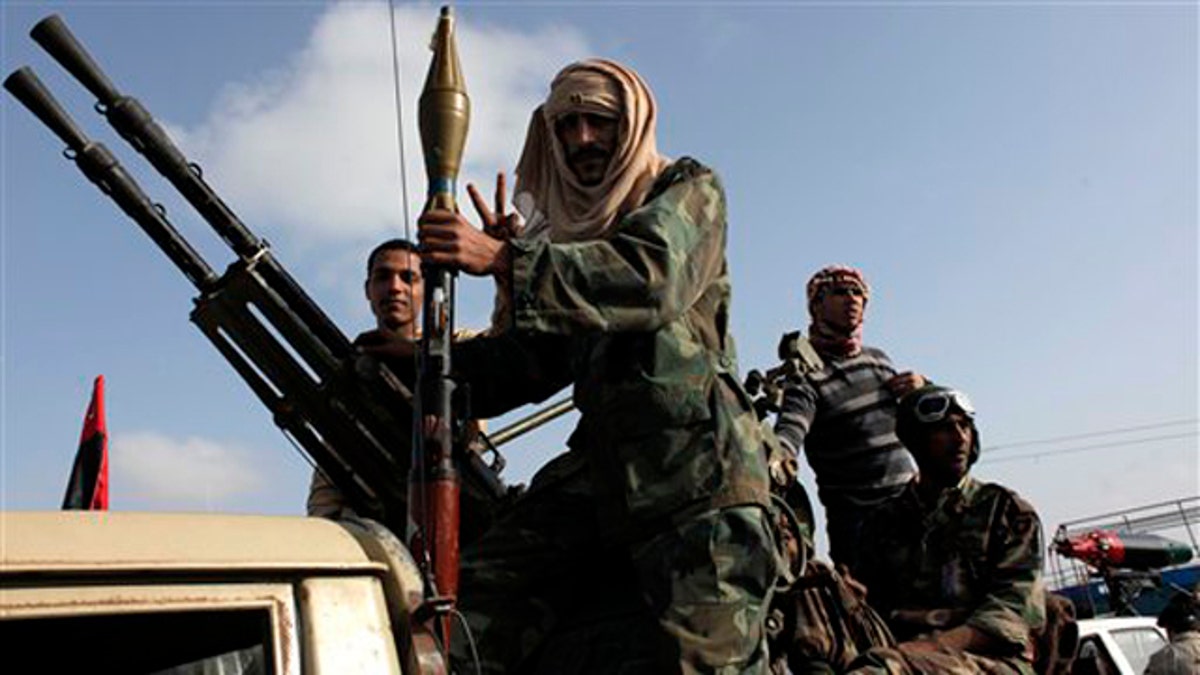
Libyan rebels take part in a military parade in Benghazi, Libya, April 27. (AP)
Fresh off an eleventh-hour deal to avert a government shutdown, Washington could face yet another ticking clock -- this one pitting the president against Congress over the military intervention in Libya.
According to a decades-old policy, the president is supposed to seek congressional authorization within 60 days of introducing U.S. forces into hostilities. This is Day 41. And Congress still hasn't passed such a measure.
Expect the debate to resume when lawmakers return from recess next week.
"Obviously, nothing's been done about this, and it still needs to be dealt with," an aide to Sen. Rand Paul, R-Ky., told FoxNews.com.
While critics of the intervention like Rep. Dennis Kucinich, D-Ohio -- and possibly Paul -- may challenge the United States' role in the mission in the coming weeks, a handful of supportive senators are looking to settle the controversy swiftly with new legislation.
Brooke Buchanan, spokeswoman for Sen. John McCain, R-Ariz., told FoxNews.com that her boss, Sen. Joe Lieberman, I-Conn., and Sen. John Kerry, D-Mass., have "finalized" the language on a Libya resolution and plan to introduce it "as soon as possible."
She said, though, that the resolution is not for "use of force" in Libya. "It is a non-binding resolution that outlined steps that should be taken in Libya," Buchanan told FoxNews.com in an email.
Lawmakers last month had been working on a "sense of the Senate" measure that would state clear support for the mission, but ran out of time to complete it and bring it to the floor before spring break.
It's unclear whether the resolution McCain and others provide would satisfy those lawmakers concerned the White House lacks the authority to sustain the U.S. military's role in what is now a NATO-led mission.
Paul thinks Congress still should "deliberate" the issue before the end of the 60-day window, his aide said.
Kucinich said last week that the president's failure to seek congressional approval "cannot be justified."
The anti-war congressman, who earlier tried to de-fund the mission, wrote in a letter to colleagues last week that he plans to offer legislation "pursuant to the War Powers Resolution of 1973 that will address Congress' constitutional responsibility to make decisions pertaining to the use of U.S. military force abroad." The War Powers Resolution states that the president must withdraw U.S. forces within 60 days, or 90 days in some circumstances, unless Congress authorizes the intervention, declares war or grants an extension of the deadline.
Kucinich said his legislation would give Congress "the latitude to make an informed decision." He said, "Congress must have the opportunity to have a full and ample debate on the commitment of U.S. Armed Forces to a war abroad."
Sen. Richard Lugar, R-Ind., ranking Republican on the Senate Foreign Relations Committee, has also continued to voice skepticism about the mission, as fighting has dragged on and raised concern about the possibility of a stalemate between Qaddafi's regime and Western-backed rebels.
"We don't really know who we're helping," Lugar spokesman Wayne Stanley said, noting the Indiana senator is concerned about "mission creep."
Stanley said that if the 60-day window applies, then Congress must formally weigh in.
"(Lugar) hasn't said one way or the other whether he would support it or not," Stanley said of any resolution that might be introduced.
The U.S. role in the conflict has diminished since the outset in late March, when the U.S. military led an air strike campaign against Qaddafi's defenses in order to secure the environment for a U.N.-approved no-fly zone.
But as NATO takes its turn bombing key targets in Tripoli and elsewhere, the White House has approved the use of Predator drones. The White House also cleared up to $25 million in aid for the rebels.
Some lawmakers, like McCain and Sen. Lindsey Graham, R-S.C., have called for the United States to get more involved, and bring its best aircraft back into the fight in hopes of flushing out Qaddafi and his inner circle.
Regardless of how the mission evolves, the Obama administration has insisted all along that it acted entirely within the bounds of the law in approving military action before obtaining consent from Congress. Officials have cited the U.N. Security Council resolution authorizing nations to use all necessary measures to protect civilians in Libya, and the imminent threat Qaddafi posed to his own people.
A detailed April 1 memo from the Office of Legal Counsel to Attorney General Eric Holder said President Obama "had the constitutional authority to direct the use of force in Libya because he could reasonably determine that such use of force was in the national interest." The memo maintained that the intervention did not constitute a "war in the constitutional sense," noting that the mission was expected to "be limited to airstrikes and associated support missions."
The memo also cited Obama's authority under the War Powers Resolution to send U.S. forces abroad without prior congressional approval. However, the memo explicitly acknowledged that, according to the War Powers Resolution, "the president generally must terminate such use of force" in the 60- to 90-day window unless Congress approves it.
Fox News' Trish Turner contributed to this report.




